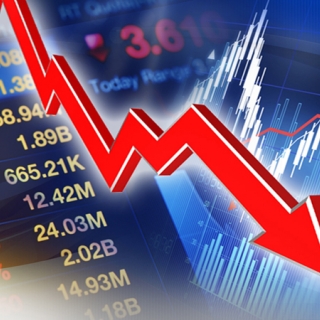


The Dow Jones Industrial Average fell again on Wednesday as rising tensions between the U.S. and its major trading partners continued to rattle investors.
The blue-chip index fell 287 points, or 0.7%. The S&P 500 traded nearly flat, while the Nasdaq Composite rose 0.6%.
President Donald Trump's steel and aluminum tariffs went into effect Wednesday, and Canada said it would slap 25% retaliatory duties on more than $20 billion worth of U.S. goods. The European Union also responded swiftly, pledging to impose retaliatory tariffs on 26 billion euros ($28.33 billion) worth of U.S. imports starting in April.
Stocks have been under pressure as traders worry that the escalating tensions could trigger a U.S. recession. One reason for the recent selloff is concern that President Donald Trump's volatile trade policies will raise inflation and slow growth, also known as stagflation.
This week alone, the Dow, S&P 500 and Nasdaq have all fallen more than 3%. The S&P 500 briefly dipped into correction territory on Tuesday, down 10% from its record set in February. Over the past month, the S&P 500 has lost nearly 8%, while the Dow and Nasdaq have fallen 6.6% and 11.3%, respectively.
"We're not surprised that the market is down. Obviously, the U.S. equity market has been very strong over the last two years. It's reasonable to expect a correction," said Dave Grecsek, managing director of investment strategy and research at Aspiriant Wealth Management. "But I think once we get through this — we're in the very early stages of this major fiscal policy shift — there will be better news."
Soft CPI
The consumer price index, a broad measure of costs across the U.S. economy, rose 0.2% over the month, bringing the annual inflation rate to 2.8%. That was below Dow Jones estimates of 0.3% and 2.9%, respectively. Core CPI, which excludes volatile food and energy prices, rose 0.2% for the month and 3.1% for the past 12 months, both below expectations.
"This reading will do a little bit to soften this stagflation narrative, and it will restore some policy flexibility from the Fed," Grecsek added. "If this inflation number is higher, some of these concerns will be much more pronounced, such as the Fed not being able to respond if the economy continues to weaken."(Newsmaker23)
Source: CNBC
Tested EN...
Asian stock markets weakened for the second consecutive day, indicating that the initial rally that had been "speedy" at the start of the year is starting to lose steam. At the same time, US governmen...
US stocks were mixed on Wednesday as investors weighed uneven economic data against expectations for eventual Federal Reserve easing, with the S&P 500 easing 0.2% and the Dow Jones sliding 0.8% fr...
European stocks were in mixed territory on Wednesday morning, as regional market jitters grow over U.S. President Donald Trump's threat to annex Greenland. The pan-European Stoxx 600 was little chang...
Asian stock markets weakened slightly on Wednesday after posting their best start to the year in history. The decline was driven by a decline in Japanese stocks amid escalating tensions with China. Th...
Oil prices stabilized on Thursday (February 12th), as the market reassigned a risk premium to US-Iran tensions despite US inventory data showing swelling domestic supplies. This movement confirms one thing: geopolitical headlines are still more...
Gold prices weakened slightly on Thursday (February 12th), as more solid US employment data reduced market confidence in an imminent Federal Reserve interest rate cut. The strong employment data prompted market participants to shift expectations of...
The Hang Seng Index reversed its downward trend in Hong Kong on Thursday (February 12th), weakening by around 0.9% to around 27,000 after a strong session earlier. This decline halted the momentum of the short term rally, as investors began to...